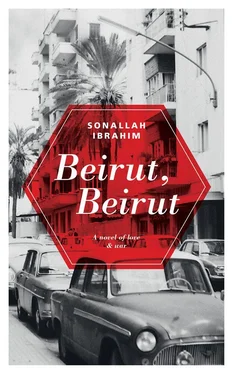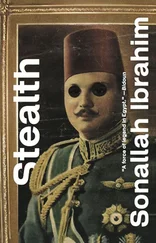I stood waiting for a car to take me to Antoinette’s office. An empty one stopped in front of me, so I asked the driver to take me to Ain Mreisseh.
The burly security guard was sitting at the entrance to the building, beside one of the armed guards. Reluctantly, he accompanied me upstairs, and handed me over to the secretary, who called Lamia to let her know, and asked me to wait.
I sat down on a seat facing her. I began looking over into the hallway, at the end of which was Lamia’s office. Her door was closed.
After a few moments, the door opened and she emerged. She was wearing a blouse patterned in magnificent colors with long, wide sleeves and gray velour pants. Her hair was plaited in two large braids, and she looked like a teenage girl.
She approached me, taking slow steps, with an absentminded look in her eye, as if she had been taken off-guard. She gave me her hand and forced a smile.
“Nice to see you,” she said by way of addressing me.
She turned back toward her office, and I walked behind her. At that moment I saw the hem of her blouse dangling over her pants.
The face of her friend who I had seen in the café looked up at me. She was sitting on a couch, with her legs crossed and sipping coffee.
Lamia headed toward her desk, walked around it, and then sat down, saying: “My friend Jamila. You’ve seen her before.”
I inclined my head toward her, walked to Lamia’s desk, and sat on the chair in front of it. I put my shoulder bag on the floor.
I looked over at Jamila and asked her, “Do you work in publishing, too?”
She smiled and shook her head.
“Close to publishing,” Lamia said. “She is a bank manager.”
I turned toward Lamia.
“I called you yesterday,” I said.
She shot a quick look at her friend. “I wasn’t at home,” she explained.
“I took the manuscript for your book from Lamia, and I’ll be reading it today,” Jamila said to me.
“Don’t worry,” Lamia quickly piped in. “I only have the last chapter left to read.”
“I’m not worried,” I said. “All I want is to finish up this matter before I travel.”
“When are you leaving?” Jamila asked me.
“Within a week.”
The secretary brought coffee, and I sipped it in silence, while Lamia occupied herself with the papers on her desk. Her friend got out a notebook from her purse, and began flipping through the pages. The vibrant red she had painted on her lips was well-suited to the shape of her broad face, and to the color of her wheat-brown skin. She looked to me at least ten years older than Lamia.
I finished my coffee, picked up my shoulder bag and stood up, while telling Lamia, “I have to be going now. I’ll call you later.”
She made no attempt to keep me from leaving, and didn’t see me to the door. She was content to merely shake my hand while she sat. With a nod of the head to her friend, I left her office.
I fought off an urgent desire for a drink, and took a taxi to Fakahani.
I found Antoinette in the editing room. I noticed that she had arranged her hair carefully, and done her nails in clear nail polish. She was wearing a tight woolen blouse that emphasized her small breasts.
I got my pen and paper ready and turned out the light. Then I took my place next to her in front of the Moviola. She touched the machine’s reel, and scenes dealing with the fall of Tel Zaatar passed before us, one after another.
She stopped the machine suddenly, and said, “Do you need to record the next section? It’s only the testimonies of a group of women who escaped from the massacre. They don’t need any voiceover commentary.”
I thought for a moment. “Maybe. But I should familiarize myself with the content of the testimonies, their rhythms, their length, and their connection to the scenes coming before and after. Getting to know them like this will determine the ending for the voiceover that comes before: whether it should be incorporated into them or end before them, with a climax or without one. I will record everything so I can work on it in my own time.”
“As you wish,” she replied.
The Fourth Part of the Film
Women in the prime of life or in middle age. Their clothes are simple. Their heads are covered in scarves knotted below their chin. Their voices are dry, with no trace of life in them. The camera stays motionless on each woman until she finishes her testimony.
Title card:
Umm Ali Salem, age 50.
“When they expelled us from Palestine, we went to Syria. Then we came to Tel Zaatar. We were always being chased away. The supervisor Abu Aboud from Lebanon’s Deuxième Bureau would eavesdrop on us from under the window. Afterwards, they imprisoned my husband because of the leaflets. All my sons joined the resistance when they were young, and they went to training sessions, and then carried weapons. I only have one son left. I used to participate in the illiteracy-eradication units that worked in the camp. The men of the Deuxième Bureau would often take my husband and torture him to make him tell them where the children were. They began coming every day to inspect the house and ask about the children. But all that changed after the resistance took over the supervision of the camp.
“During the siege, five of my sons died as martyrs in the camp. When we left Zaatar, I took with me the shirts that belonged to my martyred sons, so I could smell their precious scent… I learned that they dragged my husband: they tied his feet with a rope to separate cars, and then started driving.”
Title card:
Zaynab Umm Ali, age 40, mother of ten.
‘‘Abu Aboud met with me individually. One day, at 11 pm, he knocked on the door. I quickly opened it, and there was Abu Aboud, and George Hazini with him. The first one hit me and the second one shouted. ‘You coward,’ I told him. That’s when my children came out, asking, ‘What do you want with my mother?’ He took me to see Ahmad al-Azuri. Abu Ahmad beat me five times with a whip. I stayed there for eleven hours. I slept on the floor with my hands over my eyes… They kept me in jail with them for three days…
‘‘Then the resistance came and killed the agents. I began working in the young men’s military camp… When the siege of the camp began, a bomb landed, and made a martyr of my sick husband. It also made a martyr of my daughter while she was going to see her father… Suddenly Sobhi Iraqi and Hasan Shahrur came to the shelter and said, ‘We want some young men to fetch the martyr Namr,’ but no one moved. My grown son, who was sixteen, and I went and we removed the martyr Namr. On the way back, my only son was martyred. My son — there was nothing dearer to me than him, except Palestine, because he was my only son among nine daughters.’’
Title card:
Nuzha Hasan al-Duqi, age 65, mother of five sons and grandmother of ten.
“… When the events started, my son Ahmad, who was thirty-eight, returned from a trip. He was carrying a gift from a friend of his to his wife and sons in Jdaide, and he didn’t return. We found his body after three months in a morgue there.
“During the events, my son Jalal was martyred by a bomb. One day my daughter Fatum went to fill the water buckets and didn’t come back, since a bomb struck her and she was martyred instantly.
“When the shelter collapsed, my son Ali was working to remove the rubble. The isolationists aimed a projectile at him and he fell down and died a martyr.
“When the camp fell, my husband and his three sons and my grandsons went out. The isolationists blocked their way at the church, and stood my three sons up against the wall and began beating them with wooden clubs on their backs with all their strength until they fell down. And they killed one of my grandsons. I cried and screamed, but my grandchildren wanted me to be quiet so the gunmen wouldn’t take them… When we arrived at the hostel, they began having fun with us, and once they told us to run up to the third floor with a hail of bullets behind us. We would run and shove each other, hiding behind each other… Finally, they took us out to the street and made us get into trucks. I stood next to my husband, who clung to the truck’s metal railing… The gunmen brought out young men and killed them in groups in front of us. My husband cried; one of the gunmen noticed him and took him down from the truck. They began torturing the young men in front of him, then they killed him, and he fell to the ground. My grandchildren screamed in terror, so they fired bullets at us and we quickly got down from the truck, without thinking. My grandchildren were all lost, so here I am, living alone. I have no one left.”
Читать дальше












